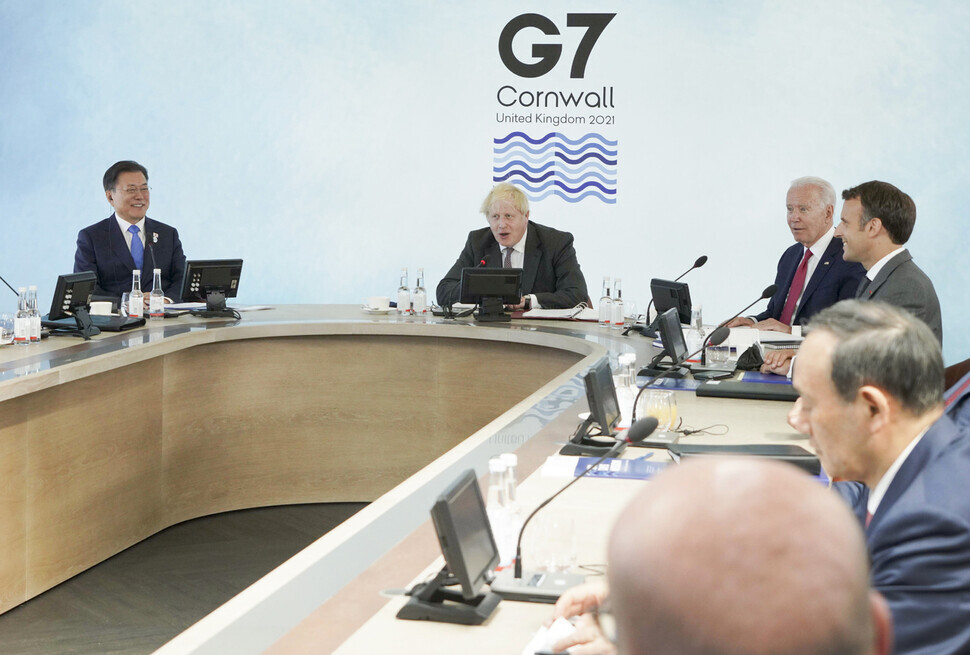hankyoreh
Links to other country sites 다른 나라 사이트 링크
[Editorial] G7 summit affirms S. Korea’s elevated status, added pressure to join forces against China

South Korean President Moon Jae-in attended as leader of a guest country and discussed COVID-19, an open society and economy, and climate change at the G7 summit that wrapped up in the English county of Cornwall on Sunday.
The presence of South Korea at an occasion for discussing global issues is a sign of its rising international stature. The leaders of the G7 countries agreed to invest US$40 trillion toward infrastructure in countries in Africa, South and Central America, and the Indo-Pacific region to counter China’s Belt and Road Initiative.
During the summit, US President Joe Biden pushed for stronger curbs on China based on multilateral diplomacy and “value-oriented diplomacy.” This stands to pose a larger burden on the South Korean government, which will need to show greater diplomatic skills, focusing on the national interest in the face of an international environment that combines opportunities with challenges.
The G7 leaders discussed measures including expanded vaccine production and supplies and vaccine support for developing countries as ways of overcoming the pandemic quickly and ensuring fair access to vaccines, treatments and diagnostic equipment.
During the public health session on Saturday — the first meeting South Korea attended as a summit guest — Moon announced plans to provide US$200 million over two years toward vaccine supplies in developing countries.
He also explained that South Korea can play the role of a global hub to expand supplies of COVID-19 vaccines, which have failed to meet global demand so far. This proposal was significant as a concrete way for South Korea to contribute to overcoming a pandemic crisis that all of humanity is now confronting.
Hopefully, we will see South Korea actively taking on a role that befits its increased national power, joining in international efforts of support and solidarity to triumph over COVID-19.
The G7 leaders responded to the Belt and Road Initiative — a vision for expanding China’s economic scope — with a decision to invest US$40 trillion in middle- and low-income countries, the White House said. This “Build Back Better World” initiative was proposed by Biden and agreed upon by the leaders of the other G7 countries.
The initiative could be seen as showing Washington’s commitment to drawing other Western countries into its rivalry with Beijing. But there was a palpable difference in intensity between the US and the other countries on how forceful the curbs on China should be.
The US tried to have the issue of Uyghur human rights in China included in the joint statement issued after the summit ended, but Germany, France and Italy were all reportedly circumspect. Each country has its national interest calculations to consider when it comes to China.
South Korea likewise enjoys a close relationship with China on peace on the Korean Peninsula and economy. It senses a need for caution about joining in activities that don’t just affirm universal values such as democracy and human rights but explicitly oppose a particular country.
Please direct comments or questions to [english@hani.co.kr]

Editorial・opinion
![[Editorial] Penalties for airing allegations against Korea’s first lady endanger free press [Editorial] Penalties for airing allegations against Korea’s first lady endanger free press](https://flexible.img.hani.co.kr/flexible/normal/500/300/imgdb/original/2024/0502/1817146398095106.jpg) [Editorial] Penalties for airing allegations against Korea’s first lady endanger free press
[Editorial] Penalties for airing allegations against Korea’s first lady endanger free press![[Editorial] Yoon must halt procurement of SM-3 interceptor missiles [Editorial] Yoon must halt procurement of SM-3 interceptor missiles](https://flexible.img.hani.co.kr/flexible/normal/500/300/imgdb/child/2024/0501/17145495551605_1717145495195344.jpg) [Editorial] Yoon must halt procurement of SM-3 interceptor missiles
[Editorial] Yoon must halt procurement of SM-3 interceptor missiles- [Guest essay] Maybe Korea’s rapid population decline is an opportunity, not a crisis
- [Column] Can Yoon steer diplomacy with Russia, China back on track?
- [Column] Season 2 of special prosecutor probe may be coming to Korea soon
- [Column] Park Geun-hye déjà vu in Yoon Suk-yeol
- [Editorial] New weight of N. Korea’s nuclear threats makes dialogue all the more urgent
- [Guest essay] The real reason Korea’s new right wants to dub Rhee a founding father
- [Column] ‘Choson’: Is it time we start referring to N. Korea in its own terms?
- [Editorial] Japan’s rewriting of history with Korea has gone too far
Most viewed articles
- 160% of young Koreans see no need to have kids after marriage
- 2Presidential office warns of veto in response to opposition passing special counsel probe act
- 3[Editorial] Penalties for airing allegations against Korea’s first lady endanger free press
- 4Months and months of overdue wages are pushing migrant workers in Korea into debt
- 5Japan says it’s not pressuring Naver to sell Line, but Korean insiders say otherwise
- 630th anniversary Wednesday Demonstration pushed out of memorial site by far-right
- 7Inside the law for a special counsel probe over a Korean Marine’s death
- 8Dermatology, plastic surgery drove record medical tourism to Korea in 2023
- 9[Guest essay] Maybe Korea’s rapid population decline is an opportunity, not a crisis
- 10Trump asks why US would defend Korea, hints at hiking Seoul’s defense cost burden